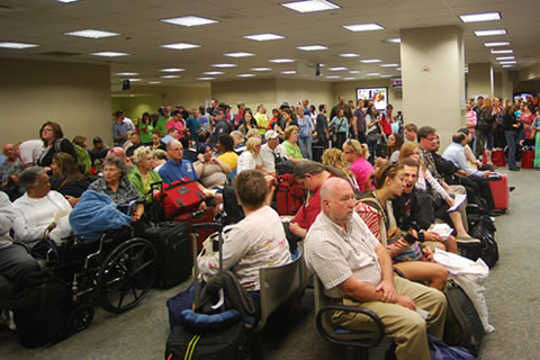
As progressives in Congress cast attention on Medicare for All legislation this week, research published Thursday highlighted that Americans are frustrated and struggling due to the for-profit U.S. healthcare system.
"We must begin to change this trajectory with smarter policies that put patients over profits."
Gallup and West Health unveiled their new Healthcare Affordability Index and Healthcare Value Index, which are based on the opinions of over 6,600 American adults surveyed last fall, during the ongoing Covid-19 pandemic.
The surveys revealed that an estimated 44% of American adults—or roughly 112 million people—are struggling to pay for healthcare and a full 93% feel they "are paying too much for the quality of care received."
Senate Budget Committee Chair Bernie Sanders (I-Vt.)—who on Wednesday announced his panel will hold a Medicare for All hearing in early May—highlighted the findings on Twitter as evidence of the need for an overhaul.
According to a new Gallup poll, 112 million (44%) Americans are struggling to pay for healthcare, and more than double that number (93%) feel that what they do pay is not worth the cost. Yes. It's time for a health care new system. It's time for Medicare for All.
— Bernie Sanders (@SenSanders) March 31, 2022
Sanders' announcement about the upcoming event came a day after the House Committee on Oversight and Reform held a Medicare for All hearing—during which Rep. Rashida Tlaib (D-Mich.) pointed out how the pandemic has "exposed just how broken the healthcare system is in our country."
"Millions of people across the country know that passing Medicare for All is long overdue," Tlaib said. "In the richest country, our residents should not face financial ruin, continue to be sick, or even die, because they lack adequate coverage and care."
The new research reveals that's exactly what many Americans endure. Gallup and West Health found that nearly half of American adults are "cost insecure" or "cost desperate," meaning they report recent occurrences of not being able to afford healthcare and aren't likely to have easy access to affordable care, or they consistently can't afford needed treatment or prescribed medication and lack easy access to care, respectively.
As Gallup senior researcher Dan Witters detailed in a blog post:
The likelihood of being cost desperate is more than four times greater for those living in households earning under $48,000 per year (13%) compared with those living in households earning $90,000+ per year (3%). Fewer than three in five Americans are classified as "cost secure," meaning they report being able to consistently access and pay for quality care and medicine. Men are more likely to be classified as cost secure than are women (60% to 53%), and Hispanic adults (51%) are less likely to be cost secure than non-Hispanic white counterparts (58%).
"These indices are tracking the healthcare cost crisis in America and its impact on everyday Americans," said West Health president Tim Lash. "Bottom line—Americans are increasingly getting priced out of the system and many of those who can still afford to pay don't think they're getting their money's worth relative to the cost."
The pandemic has brought to light the need for Medicare for All, says Dr. Adam Gaffney (@awgaffney), professor @HarvardMed.
— Democracy Now! (@democracynow) March 31, 2022
"We need universal healthcare so that people have all medical conditions covered." pic.twitter.com/GLIpqo5Ch9
Half of those surveyed said that "either their household or Americans generally are paying too much for the quality of the care that they receive or that their most recent care experience was not worth the cost," Witters noted.
Another 45% "report that both their household and Americans generally are paying too much for the quality of the care that they receive and that their most recent care experience was not worth the cost," he continued. That means just 5% of Americans believe the care they receive is worth the cost.
According to Lash, "We must begin to change this trajectory with smarter policies that put patients over profits."
Witters, in a statement, suggested that their findings could help guide decision-makers' reform efforts.
"These estimates are important resources for policymakers, researchers, and the public to evaluate and understand the burden of high healthcare costs," he said. "The indices paint a comprehensive picture of why Americans are unable to keep pace with the rising costs and don't see value in the care they are receiving."
Related Books:
The Body Keeps the Score: Brain Mind and Body in the Healing of Trauma
by Bessel van der Kolk
This book explores the connections between trauma and physical and mental health, offering insights and strategies for healing and recovery.
Click for more info or to order
Breath: The New Science of a Lost Art
by James Nestor
This book explores the science and practice of breathing, offering insights and techniques for improving physical and mental health.
Click for more info or to order
The Plant Paradox: The Hidden Dangers in "Healthy" Foods That Cause Disease and Weight Gain
by Steven R. Gundry
This book explores the links between diet, health, and disease, offering insights and strategies for improving overall health and wellness.
Click for more info or to order
The Immunity Code: The New Paradigm for Real Health and Radical Anti-Aging
by Joel Greene
This book offers a new perspective on health and immunity, drawing on principles of epigenetics and offering insights and strategies for optimizing health and aging.
Click for more info or to order
The Complete Guide to Fasting: Heal Your Body Through Intermittent, Alternate-Day, and Extended Fasting
by Dr. Jason Fung and Jimmy Moore
This book explores the science and practice of fasting offering insights and strategies for improving overall health and wellness.
care
























